
Fela Aníkúlápó Kuti, also known as Abami Eda, was a Nigerian musician, bandleader, composer, political activist, and Pan-Africanist. He is regarded as the pioneer of Afrobeat, a Nigerian music genre that combines West African music with American funk and jazz. At the height of his popularity, he was referred to as one of Africa's most "challenging and charismatic music performers". AllMusic described him as a musical and sociopolitical voice of international significance.
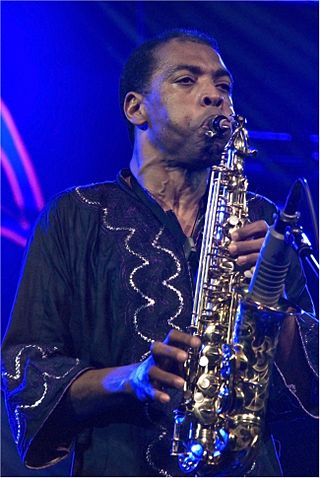
Olufela Olufemi Anikulapo Kuti, popularly known as Femi Kuti, is a Nigerian musician born in London and raised in Lagos. He is the eldest son of Afrobeat pioneer Fela Kuti and a grandchild of political campaigner, women's rights activist and traditional aristocrat Funmilayo Ransome-Kuti.

Tony Oladipo Allen was a Nigerian drummer, composer, and songwriter who lived and worked in Paris, France. Allen was the drummer and musical director of Fela Kuti's band Africa '70 from 1968 to 1979, and was one of the founders of the Afrobeat genre. Fela once stated that "without Tony Allen, there would be no Afrobeat". He was described by Brian Eno as "perhaps the greatest drummer who has ever lived".

The Best Best of Fela Kuti is a 2-CD compilation album by Nigerian Afrobeat artist Fela Kuti, released in 1999 by MCA Records. It was issued in the United States in 2000 as part of a reissue series of Kuti's albums. The album was reissued as The Best of the Black President in 2009 by Knitting Factory Records and received universal acclaim from music critics. A companion 2-CD compilation, also released in 1999, was reissued in the U.S. in 2013 by Knitting Factory as The Best of the Black President 2.
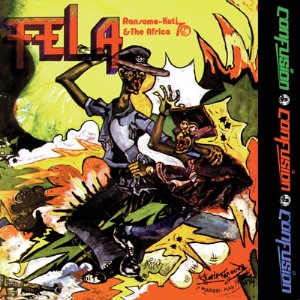
Confusion is a 1975 album by Nigerian Afrobeat musician Fela Kuti and his Africa 70 band. It was arranged, composed, and produced by Kuti, who recorded the album after choosing to emphasize his African heritage and nationalism in his music. Confusion is a commentary on the confused state of post-colonial Lagos and its lack of infrastructure and proper leadership at the time. Kuti's pidgin English lyrics depict difficult conditions in the city, including a frenetic, multilingual trading market and inextricable traffic jams in Lagos' major intersections.
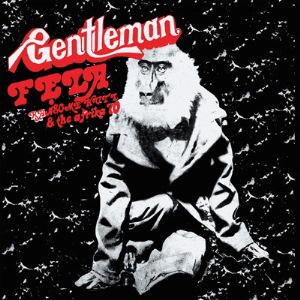
Gentleman is a 1973 studio album by Nigerian Afrobeat musician Fela Kuti. It was written and produced by Kuti and recorded with his Afrika 70 band. The cover artwork's depiction of a monkey's head superimposed on a suited body is a reference to the album's title track, which Kuti composed as a commentary on the colonial mentality of Africans who adhered to European customs and clothing.
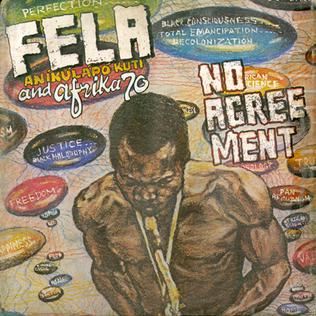
No Agreement is an album by Nigerian Afrobeat composer, bandleader, and multi-instrumentalist Fela Kuti, recorded in 1977 and originally released on the Nigerian Decca label.
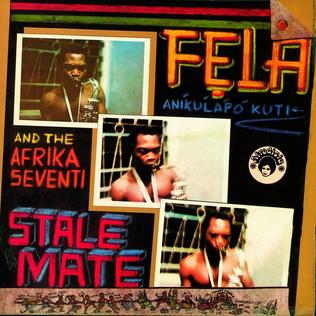
Stalemate is an album by Nigerian Afrobeat composer, bandleader and multi-instrumentalist Fela Kuti recorded in 1977 and originally released on the Nigerian Decca label.

Sorrow Tears and Blood is an album by Nigerian Afrobeat composer, bandleader, and multi-instrumentalist Fela Kuti recorded in 1977 and originally released on the Nigerian Kalakuta label.

Shuffering and Shmiling is an album by Nigerian Afrobeat composer, bandleader, and multi-instrumentalist Fela Kuti, recorded in 1977 and originally released on the Nigerian Coconut label.

Unknown Soldier is an album by Nigerian Afrobeat composer, bandleader and multi-instrumentalist Fela Kuti, recorded in 1979 and originally released on the Nigerian Skylark label.

Why Black Man Dey Suffer is an album by Nigerian Afrobeat composer, bandleader, and multi-instrumentalist Fela Kuti recorded in 1971 and originally released on the Nigerian African Sounds label after EMI refused to release it.

Fela's London Scene is an album by Nigerian Afrobeat composer, bandleader, and multi-instrumentalist Fela Kuti, recorded in England in 1971 and originally released on the Nigerian EMI label.

Open & Close is an album by Nigerian Afrobeat composer, bandleader, and multi-instrumentalist Fela Kuti, recorded in Lagos in 1971 and originally released on the Nigerian His Master's Voice label.

Shakara is an album by Nigerian Afrobeat composer, bandleader, and multi-instrumentalist Fela Kuti, recorded in Lagos in 1971 and originally released on the Nigerian EMI label.

Roforofo Fight is an album by Nigerian Afrobeat composer, bandleader, and multi-instrumentalist Fela Kuti recorded in Lagos and originally released on the Nigerian EMI label Jofabro in 1972.

Afrodisiac is an album by Nigerian Afrobeat composer, bandleader, and multi-instrumentalist Fela Kuti, originally released on the Nigerian EMI label in 1973. The album's four tracks were re-recordings of Nigerian 45s redone in London in 1972. The album features Kuti's first Nigerian hit "Jeun Ko Ku," which sold over 200,000 copies.
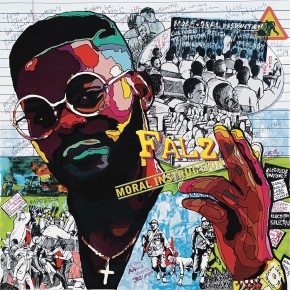
Moral Instruction is the fourth studio album by Nigerian rapper Falz. It was released on January 15, 2019, by Bahd Guys Entertainment. The album was recorded in Nigerian pidgin and samples musical recordings from Fela Kuti. Its production was primarily handled by Sess, with additional production from TMXO, Willis, and Chillz. The album features collaborations with Demmie Vee, Chillz and Sess. Moral Instruction addresses societal issues such as corrupt politicians, corruption, police brutality, prostitution, social injustice and internet fraud. The album's release was preceded by "Talk", a socio-conscious record that addresses critical events. The cover art for Moral Instruction was created by Nigerian artist Lemi Ghariokwu, a long-time Fela collaborator. The album won Best Rap Album and Album of the Year at The Headies 20190

Teacher Don't Teach Me Nonsense is a 1986 studio album by Fela Kuti and the Egypt 80.

Army Arrangement is a 1985 studio album by Fela Kuti.




















